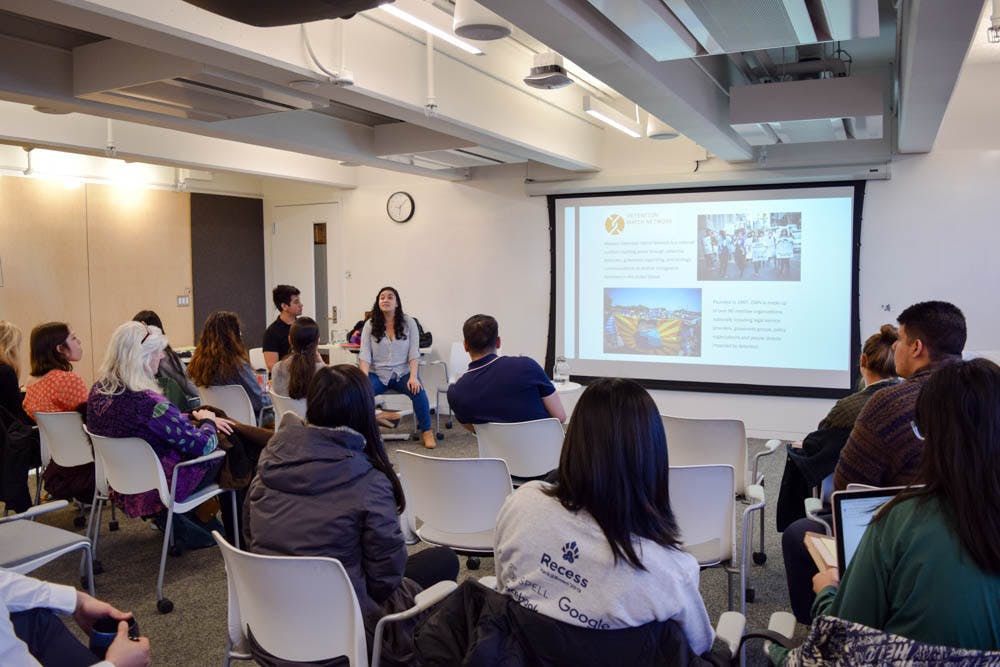Representatives from the Detention Watch Network and the Adelante Alabama Workers Center spoke about the immigration detention infrastructure in the United States at the Undocumented, First-Generation College and Low Income Student Center on Wednesday night.
Titled “Communities Not Cages: Conversations with Detention Watch Network,” the event concluded the U-FLi Center’s ongoing “undocu-series,” which shares narratives from undocumented individuals.
Founded in 1997, the DWN is a national coalition that supports “migrant humans and the policing they face” and works to “combat the explosive growth of the U.S. immigrant detention system,” according to the event’s Facebook page.
In addition, the Adelante Alabama Workers Center strives to unite “day laborers, domestic workers, and other low-wage and immigrant workers and their families in the Birmingham area to defend our rights, promote our dignity, and pursue justice for all,” according to the center’s website.
The event began with an activity that allowed attendees to engage in a discussion about “the history of criminalizing migrant bodies” in the United States, said Gabriela Marquez-Benitez, membership director for the DWN. Attendees were asked to move to the right or left side of the room based upon the degree to which they agreed with various statements about detainment and imprisonment in the U.S.
During the activity, event attendees shared their personal experiences with detainment or undocumented status. One student participating in the Deferred Action for Childhood Arrivals program spoke about having a “mixed status family” — which includes family members with different immigration statuses. Given her family’s complicated legal status, they need to be strategic about where they live to avoid deportation, she said.
Following personal insight from audience members, Marquez-Benitez and Barbara Suarez Galeano, another organizer for the DWN, provided a statistical overview of immigrant detention and outlined the DWN’s fight against the immigrant detention system in the United States.
Over 50,000 individuals are currently held in 200 immigrant detention centers around the country, Marquez-Benitez said. Although U.S. Immigration and Customs Enforcement oversees detainment of undocumented individuals, a majority of the detention facilities themselves are operated by for-profit companies. “The fact that these detention centers are for-profit means that they’re trying to cut costs at every corner,” she said.
Cutting costs contributes to poor conditions inside such detention centers, including “horrible food, labor with slave wages, forced labor,” minimal health care and the deaths of over 180 people since 2003, Marquez-Benitez said. “It’s really important to recognize that conditions are systemically egregious and immoral,” she added.
In response to these conditions, detained individuals have held eight hunger strikes at detainment centers across the nation this year. ICE has since retaliated by placing hunger strikers in solitary confinement, transferring them to other detainment centers and force-feeding the individuals on strike, Marquez-Benitez said.
“We have to think about the boldness and courage of people inside the detention centers and how we as outsiders can best respond to that,” Suarez Galeano said. “The immigrant and criminal justice system is unjust, founded on white supremacy, capitalism and ableism,” she added.
To fight this injustice, the DWN outlined three major goals in ending the immigrant detention system: stopping the expansion of detention centers nationally, shutting down existing detention centers and reducing the flow of federal funds to ICE.
The intersectionality between the DWN and the Black Liberation Movement is critical to the success of the DWN’s goals, as each movement fights intensely against incarceration and the prison system, Suarez Galeano said. “Historically, the immigrants’ rights movement has had a really toxic relationship” with the Black Liberation Movement, especially within the debate of who is defined as a criminal, she said. Unless the DWN is working with the Black Liberation Movement, “it’s just going to be a game of who gets put in jail,” she added.
Gabriel Cabán Cubero, detention and enforcement organizer for the Adelante Alabama Workers Center, concluded the event by sharing their experience working to shut down the Etowah County Detention Center in rural Alabama and release detainees by providing legal help and logistical accommodations.
The ECDC is well-known for its notoriously deplorable conditions for detained individuals, Cabán Cubero said. Under President Obama, the detention center was nearly shut down due to poor conditions, but the ECDC has since expanded under the Trump administration.
Since the election of President Trump, the plight of undocumented immigrants has only worsened, Cabán Cubero said. “Racists are being emboldened, police are being empowered and detention is intensifying,” they said.
John Lopez-Aldas ’19, undocumented student program staffer for the U-FLi Center, helped organize the event as the final part of U-FLi’s “undocu-series.”
“It’s important to hold these conversations, workshops and teaching moments because these are issues affecting students on this campus or their families and (these issues) are something they often need to stay silent about,” Lopez-Aldas said.
The DWN was invited to the undocu-series as a “way to make something that for most people seems very abstract more understandable and concrete,” Lopez-Aldas said.
One attendee, Angel Mendez-Flores ’20, who was involved in the Brown Immigrant Rights Coalition last semester, wanted to use the event “to reintroduce himself to the campaign and be more informed about the work people are doing around the country to dismantle the immigration detention complex.”
Nancy Green, a longtime Providence resident and activist involved in the local grassroots fight against immigrant detention, came to the event to learn more about the national movement against detainment. “I’m so glad I came. The speakers brought clarity to a lot of things that were confusing to me,” she said.
Green has visited the Donald W. Wyatt Detention Facility in Central Falls, Rhode Island as part of protests organized by the Alliance to Mobilize our Resistance. “It just feels so very un-American for people to be pulled into a prison, to be detained. It isn’t right,” she said.





